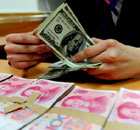-
-
China Daily E-paper
Zhu Yuan
Alienated with this new strange place
By Zhu Yuan (China Daily)
Updated: 2010-04-07 07:18
 |
Large Medium Small |
On many occasions strolling through downtown Beijing, I would often think about whether my father would recognize Beijing if he were alive today. He used to brag about his familiarity with almost every downtown street in the city where he graduated from high school and college. But after giving it some more thought, I think Beijing would be a strange new place to him.
Even I, after witnessing the constant changes here in the past two decades, find it difficult to find some store or restaurant on a street that used to be so familiar to me.
In the book Stranger to Its Motherland, an author attempts to better understand the motherland by traveling from its most northeastern town to its most southwestern end. It is a book with many sentiments that I share.
The book does not just detail the nation's physical changes. He talks with many during his journey and he concludes that his feelings of complete alienation result from changes in people's values.
Chinese people are no longer what they used to be: They are not the people who would be satisfied in life if they had their own land to till, had a wife that cooks or children playing around them, all of which are described in Lin Yutang's book My Country and My People.
As far as I know through my chats with colleagues and friends and through my own personal experience, anxiety and insecurity are the right words to describe the frame of mind of many, despite the fact that living standards have improved considerably from three decades ago.
Remembering my university days in the early 1980s, I personally feel that those were my happiest days. When I said this to several of my friends, they said that they felt the same. Back then, we earned less than we do now and our living conditions were much worse. But there was much we could expect of life in the future.
The hopes of having a stable job with a stable income and leading a family life of one's own was not too far away. A farmer making more than 10,000 yuan did not seem to strike a cord with many young people although that amount of money was at the time more than 10 times what a government worker would earn.
I don't know when I started feeling less secure, when the happiness began to fade and when the anxiety began to creep up on me.
Maybe it's because of the way some have become overnight millionaires or billionaires, and maybe it's because the income gap between the rich and poor has never been so wide. Maybe it's because the high expectations in life have been diminishing for people of different ages in recent decades.
Maybe it's because everybody is talking about money or about fancy things such as luxurious homes, mistresses, and whatever one wants. Everybody seems to be also talking about more ways of making more money, but this obsession with money has deprived us of our souls.
And maybe it's because housing prices are too high. In big cities such as Beijing and Shanghai, young people can't even entertain the thought of buying a two-bedroom home without thinking about saving every penny they've earned and will earn for a lifetime. "What else do we have to talk about?" may be the question that a young man, abandoned by his girlfriend simply because he can't buy her a decent apartment, throws on me.
Maybe, it is the melamine milk scandal, the use of recycled cooking oil in some restaurants and pesticide-contaminated vegetables that make you feel like you urgently need to be a man of considerable wealth to get away from all of this foulness. But think about it: It's the sole pursuit of profits without any ethical concern that has resulted in these food-safety problems.
Maybe, we need to look at our own lives from the viewpoint of a stranger. Then we can ask ourselves what we truly need. We need to ask whether making money is the sole pursuit in life. If it is, where will our journey end? Does the value of life lie only in the pursuit of wealth?









